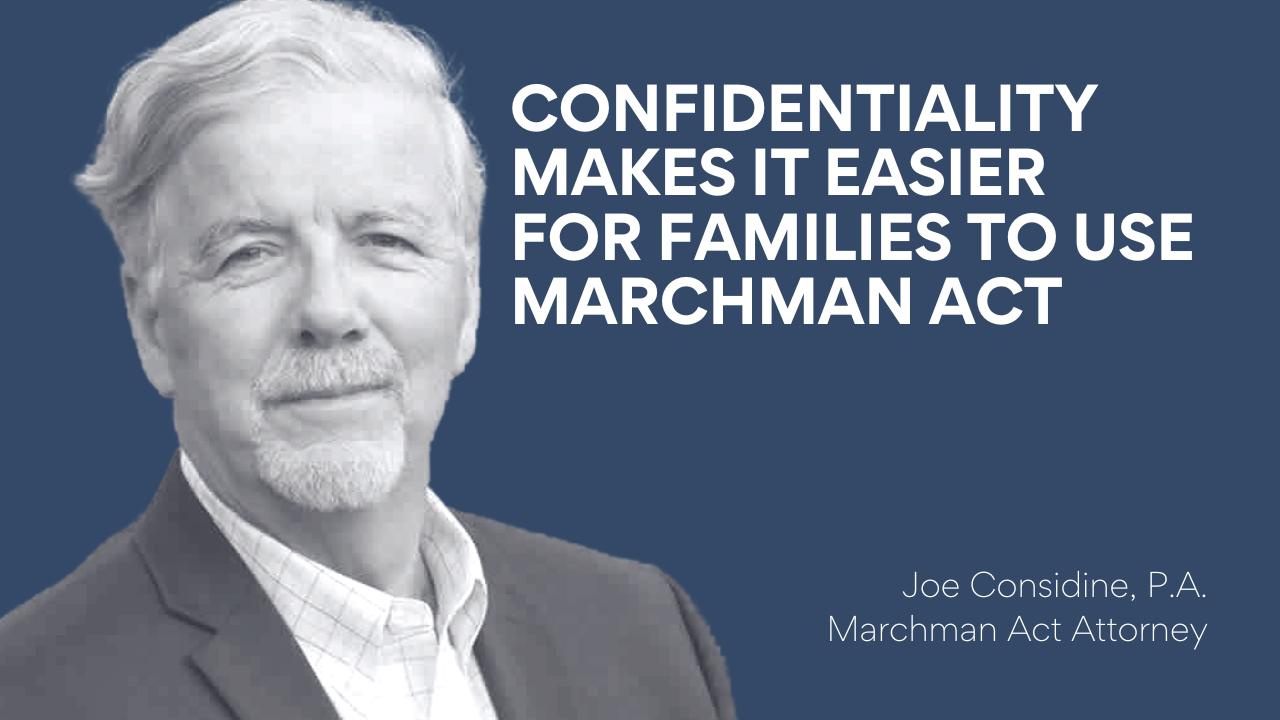Posted on August 28, 2023 View all news
Florida’s Marchman Act allows families, friends, or those with knowledge of an individual with substance use disorder to get the afflicted person into treatment using the courts.
Nationally, many are calling for the use of involuntary commitment through the courts to help deal with the scourge of the opioid epidemic and, more recently, the high-dose THC cannabis.
In enacting the Hal S. Marchman Alcohol and Other Drug Services Act, Florida Statutes Chapter 397, the Legislature exhibited the appropriate gravitas regarding substance use disorders as a horrific problem for families and society through the following language:
“Substance abuse is a major health problem that affects multiple service systems and leads to such profoundly disturbing consequences as serious impairment, chronic addiction, criminal behavior, vehicular casualties, spiraling health care costs, AIDS, and business losses, and significantly affects the culture, socialization, and learning ability of children within our schools and educational systems.”
Those words were written in 1993.
Today, one would have to add details of the staggering death rate and the loss of a generation to that list of horrors.
Despite its efficacy, anyone who works with the Marchman Act realizes the Act is not perfect. Some of its language needs to be refined to stop the damage being done by high-dose THC cannabis and opiates, including fentanyl, and to provide more effective intervention.
In addition, thirty years later, the Marchman Act is still not widely understood. While it remains a vitally effective tool for using the courts to obtain help for people who have substance use disorders, this law is underutilized by families and treatment professionals. This is, at least in part, due to a lack of education, an insufficient number of treatment beds for indigent people, problems with individuals leaving treatment contrary to court orders, and concerns about the lack of confidentiality of the process.
I want to focus on the confidentiality factor here. Families are concerned about the confidentiality of the Marchman Act, and frequently ask about the issue of non-disclosure.
Thankfully, the Florida Legislature addressed concerns about confidentiality by amending the Marchman Act to make it clear that the public should not have access to records of Marchman Act court proceedings. Marchman Act, Section 397.6760, specifies that Marchman Act court records are confidential.
All petitions for involuntary assessment, stabilization, court orders, and pleadings are confidential and exempt from the Public Records Act. The public is not allowed access to Marchman Act records or pleadings. Personal, identifying information may not be published by the Clerk on a court docket or in a publicly accessible file.
Disclosure is permitted only to limited classes, including the parties involved, their attorneys, guardians of the impaired individual, and the individual’s treating healthcare providers. A person or entity other than any of these classes of people may gain access to Marchman Act records upon a showing of “good cause.” Yet, there are no specific cases which interpret “good cause” under the Marchman Act. There are cases, however, which have construed “good cause” in other settings, especially in family law, involving treatment information, and those cases will provide some guidance in this instance. It is extremely difficult, if not next to impossible, to get treatment records in a family law setting. And I anticipate that it would be as difficult to show good cause in a Marchman Act case. In my 25 years of practice, in both family law and in hundreds of Marchman Act cases, there has never been a release of treatment records or treatment information in any of my cases. Disclosure of information about treatment and records of treatment is strongly disfavored as a matter of public policy by the courts.
This language in the Statute made clear just how serious the Legislature viewed substance abuse:
“Substance abuse impairment is a disease which affects the whole family and the whole society and requires a system of care that includes prevention, intervention, clinical treatment, and recovery support services that support and strengthen the family unit.”
As a society, we want people with substance use disorders to get help. It is important to their recovery that these individuals are assured and feel confident that the fact they have entered into treatment, matters they discuss with therapists, and how they do in treatment should not be made public. There are protections against any disclosure in federal HIPPA laws and the protection of non-disclosure contained in the Florida Evidence Code, as well as other statutes at the state level. Put another way: in addition to the legal structure, significant therapeutic reasons support the existence of this policy.
More and more mental health treatment professionals are recommending the Marchman Act as a course of action for beleaguered families. A court order requiring the impaired individual to enter treatment is compelling and persuasive. Violation of the court order could result in incarceration. The substance user can no longer harm themselves without legal consequences. Moreover, extensive research informs us that involuntary treatment, including through the courts, is at least as effective, if not more so, than voluntary treatment.
Friends and family members worn out from trying to get their loved ones to stop using drugs/alcohol, are turning to the Marchman Act and the courts for help getting their loved ones into treatment. Such use of the legal system is an effective form of intervention for those who cannot or will not stop abusing substances. Concerns about matters of privacy should not be cause for hesitation. Confidentiality protections are written into the statute.


Thank you for your help